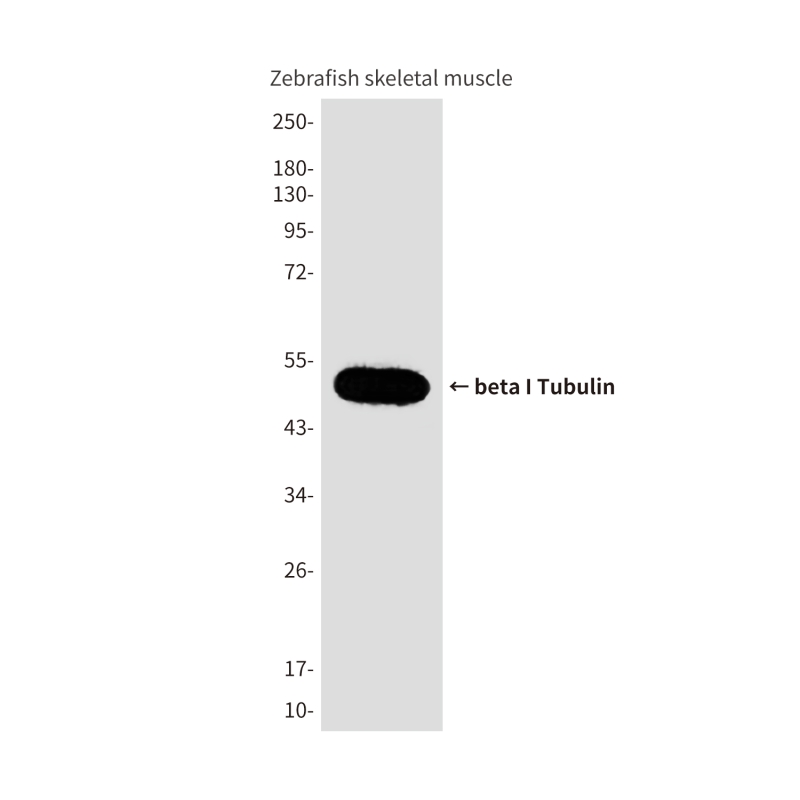
| WB | 咨询技术 | Zebrafish |
| IF | 咨询技术 | Zebrafish |
| IHC | 咨询技术 | Zebrafish |
| ICC | 技术咨询 | Zebrafish |
| FCM | 咨询技术 | Zebrafish |
| Elisa | 咨询技术 | Zebrafish |
| Aliases | beta I tubulin; TBB1; TUBB1; Tubulin beta 1; Class VI beta tubulin |
| Entrez GeneID | 81027 |
| clone | 5C3 |
| WB Predicted band size | Calculated MW: 50 kDa; Observed MW: 50 kDa |
| Host/Isotype | Mouse IgG1 |
| Antibody Type | Primary antibody |
| Storage | Store at 4°C short term. Aliquot and store at -20°C long term. Avoid freeze/thaw cycles. |
| Species Reactivity | Zebrafish |
| Immunogen | Synthetic Peptide of β I tubulin |
| Formulation | Purified antibody in PBS with 0.05% sodium azide,0.5%BSA and 50% glycerol. |
+ +
以下是关于βI Tubulin抗体的3篇经典文献及其摘要概括:
---
1. **文献名称**:*Antibodies specific to βI-tubulin reveal distinct microtubule populations in polarized cells*
**作者**:Gundersen, G.G. et al.
**摘要**:该研究利用βI-Tubulin特异性抗体,揭示了其在细胞极化过程中对微管稳定性的关键作用,并证明其富集于轴突和纤毛等结构,为神经元分化研究提供依据。
---
2. **文献名称**:*Differential antibody specificity among β-tubulin isotypes in developing mammalian brain*
**作者**:Luduena, R.F. et al.
**摘要**:通过对比多种β-Tubulin抗体,作者验证了βI亚型抗体在哺乳动物脑组织中的高特异性,并强调其在胚胎发育和肿瘤研究中区分不同微管亚型的重要性。
---
3. **文献名称**:*βI-tubulin overexpression correlates with chemoresistance in ovarian cancer*
**作者**:Kavallaris, M. et al.
**摘要**:研究发现βI-Tubulin在卵巢癌耐药细胞系中显著上调,抗体检测证实其与紫杉醇耐药性相关,提示其作为癌症治疗耐药标志物的潜力。
---
这些文献覆盖了βI-Tubulin抗体的功能验证、特异性分析及疾病应用,适用于实验设计参考。
Beta I tubulin, also classified as β3-tubulin or class I β-tubulin, is a key component of microtubules—dynamic cytoskeletal structures critical for cell division, intracellular transport, and maintaining cell shape. Encoded by the TUBB gene in humans, it forms heterodimers with α-tubulin, which polymerize into microtubule networks. Beta I tubulin is ubiquitously expressed across mammalian tissues, though specific isoforms (e.g., βIII-tubulin) show tissue-specific patterns, such as neuronal enrichment.
Antibodies targeting beta I tubulin are widely used as research tools to visualize microtubules in techniques like immunofluorescence, immunohistochemistry, and Western blotting. Due to its stable expression, beta I tubulin antibodies often serve as loading controls in protein analysis. These antibodies typically recognize conserved epitopes, enabling cross-reactivity in diverse species, including humans, mice, and rats. Monoclonal clones (e.g., AA2) and polyclonal variants are commercially available, with validation emphasizing specificity to avoid cross-reactivity with other β-tubulin isoforms.
In research, beta I tubulin antibodies help study microtubule-related processes, such as mitotic defects, neuronal development, and intracellular trafficking. They are also employed in cancer studies to assess mitotic activity or drug responses targeting microtubule dynamics (e.g., taxanes). Dysregulation of tubulin expression or polymerization is linked to neurodegenerative disorders, ciliopathies, and chemotherapy resistance, underscoring its biomedical relevance. Proper experimental controls, including isoform-specific validation, are essential to ensure data accuracy.
×